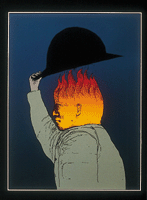Temper, temper
>> Hotheaded? Coccaro studies
the biology behind explosive anger.
 Sing,
goddess, the anger of Peleus' son Achilleus and its devastation,
which put pains thousandfold upon the Achaians…." So
begins Richmond Lattimore's translation of Homer's Iliad,
a text famously centered around the ire of Achilleus (or Achilles)
at being dishonored by his leaders. Achilles's anger is translated
by other writers as wrath and even mania. Emil Coccaro,
the director of the clinical neuroscience and psychopharmacology
research unit in the Department of Psychiatry might more accurately-if
less poetically-diagnose the Greek warrior with IED: Intermittent
Explosive Disorder.
Sing,
goddess, the anger of Peleus' son Achilleus and its devastation,
which put pains thousandfold upon the Achaians…." So
begins Richmond Lattimore's translation of Homer's Iliad,
a text famously centered around the ire of Achilleus (or Achilles)
at being dishonored by his leaders. Achilles's anger is translated
by other writers as wrath and even mania. Emil Coccaro,
the director of the clinical neuroscience and psychopharmacology
research unit in the Department of Psychiatry might more accurately-if
less poetically-diagnose the Greek warrior with IED: Intermittent
Explosive Disorder.
IED is not simply anger, but
aggression, the inability to properly deal with anger and the
tendency to be set off by the smallest provocation. "Anger
is an emotion," says Coccaro, who has been studying aggression
for 18 years, ever since he was an assistant professor of psychiatry
at the Mount Sinai School of Medicine. "The normal person
gets angry and sits there with it a bit and decides what, if anything,
they're going to do about it. They have 'reflective delay,' which
means they take time to think about how to respond. Someone with
IED will also be angry, but they get angry very fast and respond
to provocation immediately. Normal people do not express their
anger so overtly."
Bobby Knight, the former Indiana
University men's basketball coach who was as famous for throwing
chairs and choking players as for his coaching skills, may be
a more recent example of the behavior associated with IED. While
Coccaro cautions that he has never met or examined Knight, he
notes that a person "who exhibits those kinds of behaviors-screaming,
shouting, throwing things around, pushing people, breaking things-that
get them into trouble is what IED is about. Explosivity is the
key to this disorder.
"You probably know people
who are calm, cool, and collected, and nothing bothers them-that's
the opposite of IED. Then there are people who are very touchy,
and you have to walk on eggshells when you're around them."
When Coccaro lectures on IED to medical students, he refers to
a character in Martin Scorsese's film Goodfellas. Joe Pesci
plays Tommy, a quick-witted-and quick-tempered-wiseguy.
"He's got antisocial
personality disorder, but not everyone with antisocial personality
disorder explodes like that," observes Coccaro. "The
DeNiro character in that movie was antisocial, but he didn't generally
blow up; he was controlled. Pesci's character, on the other hand,
was blowing up all over the place." When Tommy kills another
wiseguy who insults him, "He overkills him; he keeps beating
him after he's dead. That's something that someone with IED might
do. Going above and beyond what's required to express their anger.
When other characters in the movie committed violent acts, on
the other hand, these were clearly premeditated."
The difference between impulsive
aggression and premeditated aggression is important for treating
IED, which may affect between 8 million and 16 million people
in the U.S. Until the mid-1990s, when Coccaro and his colleagues
began focusing on IED as a discrete disorder, that distinction
wasn't as clear. While no biological clues have been found as
to what causes premeditated aggression, IED has been linked to
low levels of serotonin in the brain and is suspected to have
a genetic element. Although diagnostic criteria are vague and
have undergone significant changes in the past decade, patients
seem to respond to drugs such as fluoxetine (Prozac) and the anticonvulsants
phenylhydantoin and divalproex.
Achilles didn't have medication
to control his temper, and if Pesci's character in Goodfellas
was waiting for the goddess Athena to descend and stay his murderous
hand, he would have discovered it was not in the script. At Chicago,
Coccaro continues his research on IED patients and hopes that
increased awareness of IED will encourage people with "bad
tempers" to seek treatment. "The thing about being able
to have a diagnosis is that you can educate people that it's a
disorder rather than just bad behavior," he says. "There's
a biology to it and a science behind it, so people can think,
'Maybe I have this chemical imbalance that can be treated,' which
is different than thinking, 'This is just me and I can't do anything
about it.'" -C.S.

![]()
 Sing,
goddess, the anger of Peleus' son Achilleus and its devastation,
which put pains thousandfold upon the Achaians…." So
begins Richmond Lattimore's translation of Homer's Iliad,
a text famously centered around the ire of Achilleus (or Achilles)
at being dishonored by his leaders. Achilles's anger is translated
by other writers as wrath and even mania. Emil Coccaro,
the director of the clinical neuroscience and psychopharmacology
research unit in the Department of Psychiatry might more accurately-if
less poetically-diagnose the Greek warrior with IED: Intermittent
Explosive Disorder.
Sing,
goddess, the anger of Peleus' son Achilleus and its devastation,
which put pains thousandfold upon the Achaians…." So
begins Richmond Lattimore's translation of Homer's Iliad,
a text famously centered around the ire of Achilleus (or Achilles)
at being dishonored by his leaders. Achilles's anger is translated
by other writers as wrath and even mania. Emil Coccaro,
the director of the clinical neuroscience and psychopharmacology
research unit in the Department of Psychiatry might more accurately-if
less poetically-diagnose the Greek warrior with IED: Intermittent
Explosive Disorder.